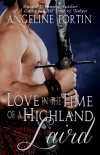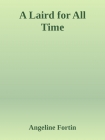A Time & Place for Every Laird, Angeline Fortin [motivational books for students .TXT] 📗

- Author: Angeline Fortin
Book online «A Time & Place for Every Laird, Angeline Fortin [motivational books for students .TXT] 📗». Author Angeline Fortin
Never. Never.
“Hugh?” Sorcha paused with a hand on hisarm. “Are you all right?”
Hugh met her concerned gaze and forced asmile. He would not burden her with his sorrow again. For all thatshe had done for him, Sorcha did not need any guilt for herinability to return him to his proper place. Only her presence hadsoftened the blow and was the balm he so desperately needed. Also,despite her assurances that the women of this time welcomed a manwith a softer side, it was not his habit to show one. “I’m well.There is much tae take in.”
“It’s good for you to get out,” she said.“Good for both of us. You know what might be fun? Maybe when we’redone here we could take a cab over to the Burke Museum. It would beeducational for you, too.”
“An art museum?”
“No, it’s a natural history museum that hasexhibits on the local Native American tribes, and there is anexhibit on the Kennewick Man that I haven’t seen yet.”
“Who is the Kennewick Man?” Hugh asked,thankful for any conversation that would draw him away from hisbleak thoughts.
“They found this skeleton at the bottom ofthe Columbia River almost twenty years ago,” Sorcha told him asthey continued to browse the produce stalls. “They dated theremains at almost nine thousand years old, from around 7500 B.C.,and they weren’t Native American but something like Polynesian, Ithink. Which would be weird, right? It’s become something of amystery, where he came from and how he got here.”
Several astonishingthoughts streamed through Hugh’s mind. How did one “date” the ageof bones? How did they know that they were not “Native American” inorigin? But the most profound was the age of the skeleton.Seventy-five hundred years beforeChrist? How was that even possible, whenall theologians of his time agreed that the world had not even beencreated by then? Most dated the time of Abraham at 4000 B.C. “Howis that possible?”
“Well, some think that there was a landbridge between Asia and North America at some point …”
Hugh closed his eyes against a wave ofexasperation, not for Sorcha’s inability to grasp his true questionbut for the ignorance of his own people. The world had changed inmany ways, far beyond the medical advances of which they hadspoken. Invention had turned a manual world into a mechanized one.Those changes, those advancements through science, he couldunderstand. But to consider that the theological foundations ofmankind were no longer true was incomprehensible. “Nae, lass, studyof the Bible has shown that God created the world but six thousandyears ago. How can this skeleton be nine thousand years old?”
With wide eyes, shestopped midstride and blinked up at him. “Oh … oh shit. When youread that History of the Worldbook, didn’t you start at thebeginning?”
No, he hadn’t. Hugh’s interest had been inlearning what had happened in the intervening years between histime and hers, not in reviewing what he knew—or thought he knew—ofthe past.
“Maybe it’s better if you just stick withthe more religious timeline of existence for now,” Sorcha wassaying in the wake of his silence. “There’s nothing wrong withthat. A lot of people still believe that way.”
There had been so much to absorb these pastdays that Hugh hadn’t even considered how far-reaching the changeshad been. His concerns had been over whether Scotland and his homehad endured. It had never occurred to him—a man of science!—toconsider how the winds of change might have altered the broaderscope of the world. “Tell me there is still an accepted God,” hebeseeched with feeling.
“Yes, there is still a God … I mean, mostmajor cultures still follow a religious deity. Christianity isstill the most widely practiced religion on Earth,” she offered inwhat Hugh had to assume was meant to be reassurance, but he wasn’tentirely comforted by her words. “Wasn’t it a huge philosophicaldebate of your time to argue over the existence of God? You didhave atheists.”
“Aye,” he allowed. “But debating andbelieving are nae the same. What led the world tae show suchfalsehood in the Bible? More science?”
“Apparently some science you could have donewithout,” Sorcha said, squeezing his arm consolingly. “But mostscientists generally agree that the universe is about four and ahalf billion years old.”
While Hugh tried to absorb thatinconceivable number, Sorcha went on to explain the expression hehad heard her use once before, the Big Bang Theory. There wereother terms like evolution, creationism, Darwin, and survival ofthe fittest; descriptions of large reptiles called dinosaurs; andthen something about monkeys that turned into men. Australopithecusand Neanderthal. “Hold,” he commanded harshly. “Are ye saying thatthe populous genuinely believes that men were born of apes?”
“Evolution is a commonly accepted scientificfact,” she said. “Most religions hold firm in the belief that Godcreated the Earth and put man on it just as he is now, but there isevidence that humans evolved over the course of millions of yearsfrom an ape-like being into the man or homo sapien we aretoday.”
Something akin to nausea roiled in Hugh’sgut. Of all the things he’d had to absorb since his arrival in thisbizarre future, this had to be the most unpleasant to contemplate.“I dinnae like tae think that my ancestors were apes.”
“I don’t think anyone does when they ponderthe idea too deeply.”
Hugh snorted at that. “And what do yebelieve?”
“I do believe in God. As far as creationism,I like to think that the seven days God took to create the universeare a relative thing in the big cosmic picture and that maybe Godwas the one who initiated the Big Bang,” Sorcha said, thenshrugged. “Who knows? Either way, there are still fights about itand how or if to teach it. Just like in your time, wars are foughtover religion every day.”
“How is it that what a man would like taesee changed through time never does, and that which he wishes taeremain the same is all that does change?”
“Now that is a mystery, isn’t it?” she saidkindheartedly. “I’m sorry to always be the one to deliver upsettingnews.”
“There is nae one else I’d rather hear itfrom,” Hugh said with complete honesty. “Ye hae been an excellenttutor





Comments (0)